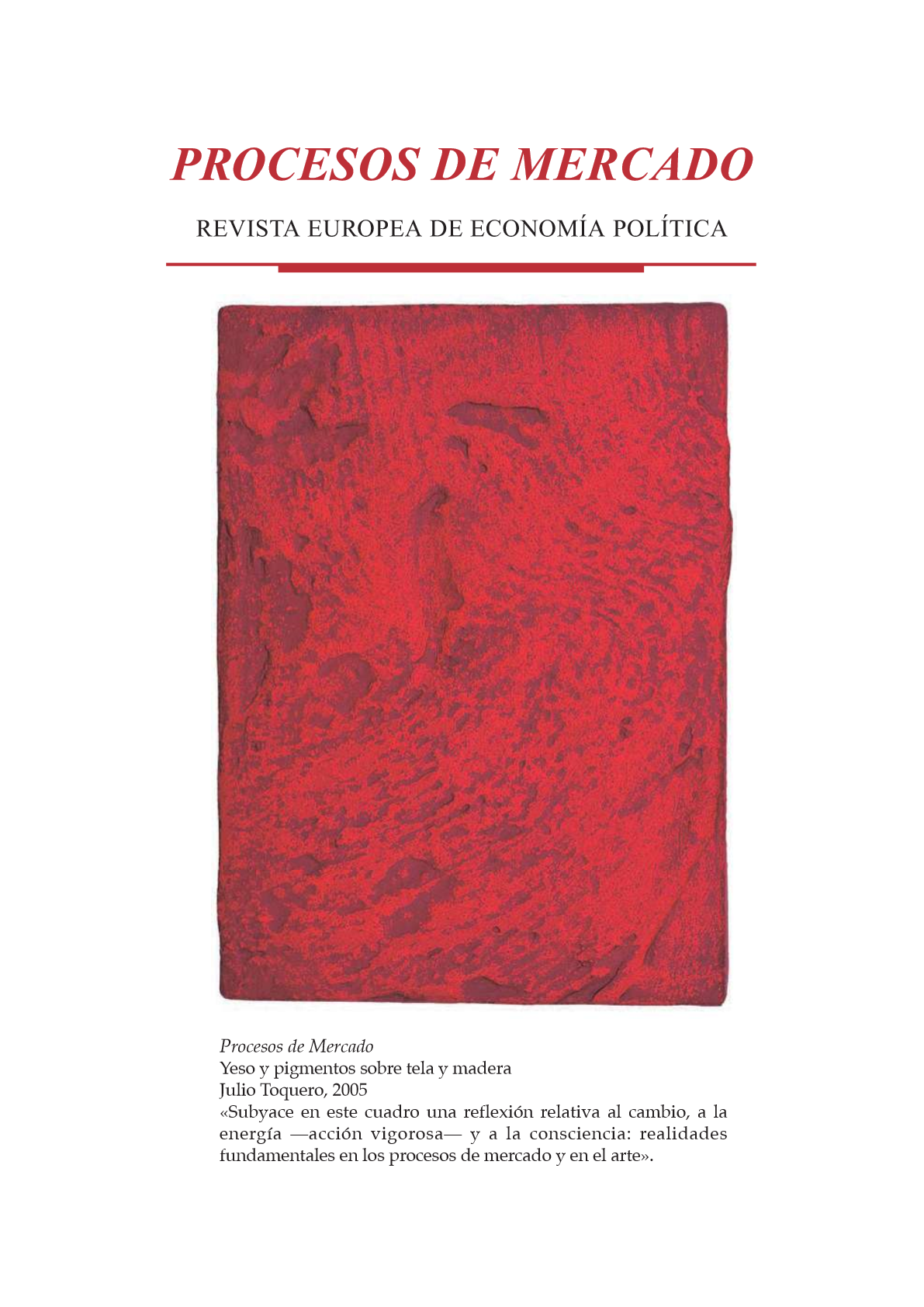EL COMUNISMO INOCENTE. LA GUERRA CULTURAL GRAMSCIANO-HEGELIANA CONTRA LA SOCIEDAD ABIERTA
DOI:
https://doi.org/10.52195/pm.v21i1.936Abstract
La última vez que oí a Carlos Rodríguez Braun hablar en público sobre liberalismo fue en la Fundación Rafael del Pino, en un acto organizado por el Centro Diego de Covarrubias a finales de enero de 2020. Impartía una conferencia1 sobre liberalismo y religión. Al final se suscitó una avalancha de preguntas y, como siempre que habla él, un debate fogoso. En el último momento, cuando el moderador cerraba el debate, ya sin tiempo para contestar, un joven muy tímido preguntó desde el fondo “¿por qué los enemigos de la libertad se sienten moralmente superiores?”. La pregunta quedó sin respuesta- ¿Por qué la izquierda se siente moralmente superior? O, mejor dicho, ¿por qué tantos conservadores liberales han asumido la superioridad moral de la izquierda colectivista? Este ensayo tiene como propósito sugerir una respuesta a esa pregunta.
Downloads
References
Ackerman, Elliot et al., “A Letter on Justice and Open Debate”, Har- pers Magazine, 7 de julio 2020, https://harpers.org/a-letter-on- justice-and-open-debate/.
Ajamian, Daniel, “Antonio Gramsci: el mayor estratega político de la historia”, Centro Mises. Escuela Austriaca de Economía e Ideas de Libertad, 2 de agosto 2020, https://www.mises.org.es/2020/08/ antonio-gramsci-el-mayor-estratega-politico-de-la-historia/.
Ajamian, Daniel, “Antonio Gramsci: the Greatest Political Strate- gist in History”, Mises Wire, [Lecture was presented on July 18, 2020 at the 2020 Mises University.] https://mises.org/wire/anto- nio-gramsci-greatest-political-strategist-history.
Álvarez Tardío, Manuel y Javier Redondo Rodela (eds.), Podemos. Cuando lo nuevo se hace viejo, Madrid: Tecnos, 2019, págs. 31-32.
Ayers, Alison (ed.), Gramsci, Political Economy and International Rela- tions Theory, NY: Palgrave MacMillas, 2008. DOI: https://doi.org/10.1057/9780230616615
Bellamy, Richard, “Gramsci, Croce and the Italian Political Tradi- tion”, History of Political Thought, Summer 1990. Vol. X, pág. 313. Bellamy, Richard, “A Crocean critique of Gramsci on historicism, hegemony and intellectuals”, Journal of Modern Italian Studies, 2001, DOI: https://doi.org/10.1080/13545710122011
6 (2), págs. 209-229. https://doi.org/10.1080/13545710110046994. DOI: https://doi.org/10.1080/13545710110046994
Bellamy, Richard, “The intellectual as social critic. Antonio Gramsci and Michael Walzer”, Jeremy Jennings and A. Kemp Welch (eds), Intellectuals in Politics: from the Dreyfus Affair to Sal- man Rushday, London and NY: Routledge, 1997, pág. 26.
Bellamy, Richard, Croce, Gramsci, Bobbio and the Italian Political Tra- dition, London: Rowman and Littlefield-Ecpr Press, 2013.
Clark, Colin, Critique of Russian statistics, MacMillan and Co. Limi- ted, London, 1939.
Cox, Robert W., “Gramsci, Hegemony, and International Relations”,
Approaches to World Order, Cambridge, C.U.P., 1996, pág. 125.
Cullen, Bernard, Hegel’s Social and Political Thought, Dublin: Gill & MacMillan, 1979.
Fonte, John “Why there is a cultural war”, Policy Review. Heritage Foundation, 2001, pág. 15, http://www.policyreviw.org/dec00/ fonte_print.html.
Fonte, John, “Gramsci’s Revenge: Reconstructing American Demo- cracy”, Academic Questions, 13, 2000, págs. 49-62, pág. 59. DOI: https://doi.org/10.1007/s12129-000-1068-y
Forgacs, David (ed.), “The Gramsci Reader.” Selected Writings 1916-1935, N.Y., New York University Press, 2000, págs. 379-381. Gill, Stephen, American Hegemony and the Trilateral Commission,
Cambridge: C.U.P., 1990, págs. 41-42. DOI: https://doi.org/10.1002/star.19900420202
Gramsci, Antonio, “Avanti!”, 14 de junio 1920, en Forgacs, David, Geoffrey Nowell-Smith, and William Boelhower. Antonio Gramsci: Selections from cultural writings. Lawrence & Wishart, 1012, citado en Forgacs, cit., pág. 72
Gramsci, Antonio, Selection from the Prison Notebook, Harvard: Harvard University Press, 1971, citado en David Forgcs, cit., pág. 313.
Gross, Neil and Solon Simmons, “The social and political views of American Professors”. Working Paper presented at a Harvard University Symposium on Professors and their Politics, Sep- tember 2007.
Gur, Ofer, “Soviet economic growth: 1928-1985”. Journal of economic literature 25.4 (1987): 1767.1833.
Jeyarj, Pravin, “Philosophy of Love: Hegel, Christianity and Envi- ronmental Law”, Christianity and Environmental Law, 24, March, 2011. DOI: https://doi.org/10.2139/ssrn.1794623
Hodgson, Peter, Hegel and Cristian Theology. A Reading of the Lectures on the Philosophy of Religion, Oxford: Oxford Universsity Press, 2005. DOI: https://doi.org/10.1093/0199273618.001.0001
Kuran, Timur, “Social mechanisms of dissonance reduction”, Peter Hedströn and Ruchard Swedberg (eds.), Social Mechanisms. An Analytical Approach to Social Theory, Cambridge: Cambridge University Press, 1998, págs. 147-171. DOI: https://doi.org/10.1017/CBO9780511663901.007
Kuran, Timur, Private Truths, Public Lies, Boston: Harvard Univer- sity Press, 1997. DOI: https://doi.org/10.2307/j.ctvt1sgqt
Landy, Marcia, “Socialist education today”, en Marcus E. Green (ed.), Rethinking Gramsci, N.Y.: Routledge, 2011, pág. 42.
Lazarsfeld, Paul F. and Wagner Thielens Jr. The Academic Mind, Glencoe, Ill: The Free Press, 1958. DOI: https://doi.org/10.1093/poq/22.2.198
Lemieux, Pierre, “Following the Herd”, Regulation, 26:4, Winter 2003-2004, págs. 16-21.
Mayo, Peter, “Antonio Gramsci and his Relevance to the Education of Adults”, en Paul Ransome (ed.), Antonio Gramsci. A New Introduction. Londres: Harvester/Wheatsheaf, 1992, pág. 28.
North, Gary, “Cultural Marxism is an Oxymoron”, Specific Answers, 1.7.2014, https://www.garynorth.com/public/12623.cfm.
Pass, Jonathan, “A (Liberal) Sheep in (Marxist) Wolf’s Clothing? Reassessing Antonio Gramsci’s Conceptualisation of Hege- mony”, Diamon. Revista Internacional de Filosofía, n. 77.2019, págs. 73-88. Pág. 73. DOI: https://doi.org/10.6018/daimon/292591
Popper, Karl, “Hegel y el nuevo tribalismo”, La sociedad abierta y sus enemigos, Barcelona, Paidós, 2010, págs. 283-4.
Prados, Leandro y Joan R. Rosés, “A long-run perspective on the productivity slowdown: Spain since 1850”, VOX. EU-CEPR, 21, Noviembre, 2020.
Rodríguez Braun, Carlos, Venerable Síntesis Liberal. Los Diez Manda- mientos, Unión Editorial, Cuaderno #7 de Cristianismo y Economía de Mercado, Centro diego Covarrubias, Madrid: 2020 (ver tambien en https://centrocovarrubias, Madrid: 2020 (ver tambien en https:// centrocovarrubias.org/cdc/wp-contect/uploads/2020/03/ CDC-Cuadernos-7-Portada-Braun-Diez-Mandamientos.pdf).
Rupert, Mark, Producing Hegemony, Cambridge: C.U.P., 1995, pág. 46. Saurin, Julian, “The Formation of Neo-Gramscians in Internatio- nal Relations” en Alison Ayers (ed.), Gramsci, Political Economy and International Relations Theory, NY: Palgrave MacMillan,
2008, págs. 27-51 (pág. 37).
Sowell, Thomas, On Classical Economics, New Haven and London: Yale University Press, 2006, pág. 185.
Taylor, Charles, Hegel and Modern Society, Cambridge, 1979, pág. Vii. The Guardian. CIA World Factbook, Reporters Without Border, The Worl Bank, Foreign Policy, and IISS Military Balane 2012) at
Watkins, Evan, “Gramscian politics and capitalist common sense”, en Marcus E. Green (ed.), Rethinking Gramsci, N.Y.: Routledge, 2011, págs. 105-111.


